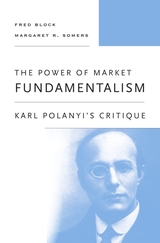
What is it about free-market ideas that give them tenacious staying power in the face of such manifest failures as persistent unemployment, widening inequality, and the severe financial crises that have stressed Western economies over the past forty years? Fred Block and Margaret Somers extend the work of the great political economist Karl Polanyi to explain why these ideas have revived from disrepute in the wake of the Great Depression and World War II, to become the dominant economic ideology of our time.
Polanyi contends that the free market championed by market liberals never actually existed. While markets are essential to enable individual choice, they cannot be self-regulating because they require ongoing state action. Furthermore, they cannot by themselves provide such necessities of social existence as education, health care, social and personal security, and the right to earn a livelihood. When these public goods are subjected to market principles, social life is threatened and major crises ensue.
Despite these theoretical flaws, market principles are powerfully seductive because they promise to diminish the role of politics in civic and social life. Because politics entails coercion and unsatisfying compromises among groups with deep conflicts, the wish to narrow its scope is understandable. But like Marx's theory that communism will lead to a "withering away of the State," the ideology that free markets can replace government is just as utopian and dangerous.

READERS
Browse our collection.
PUBLISHERS
See BiblioVault's publisher services.
STUDENT SERVICES
Files for college accessibility offices.
UChicago Accessibility Resources
home | accessibility | search | about | contact us
BiblioVault ® 2001 - 2025
The University of Chicago Press









